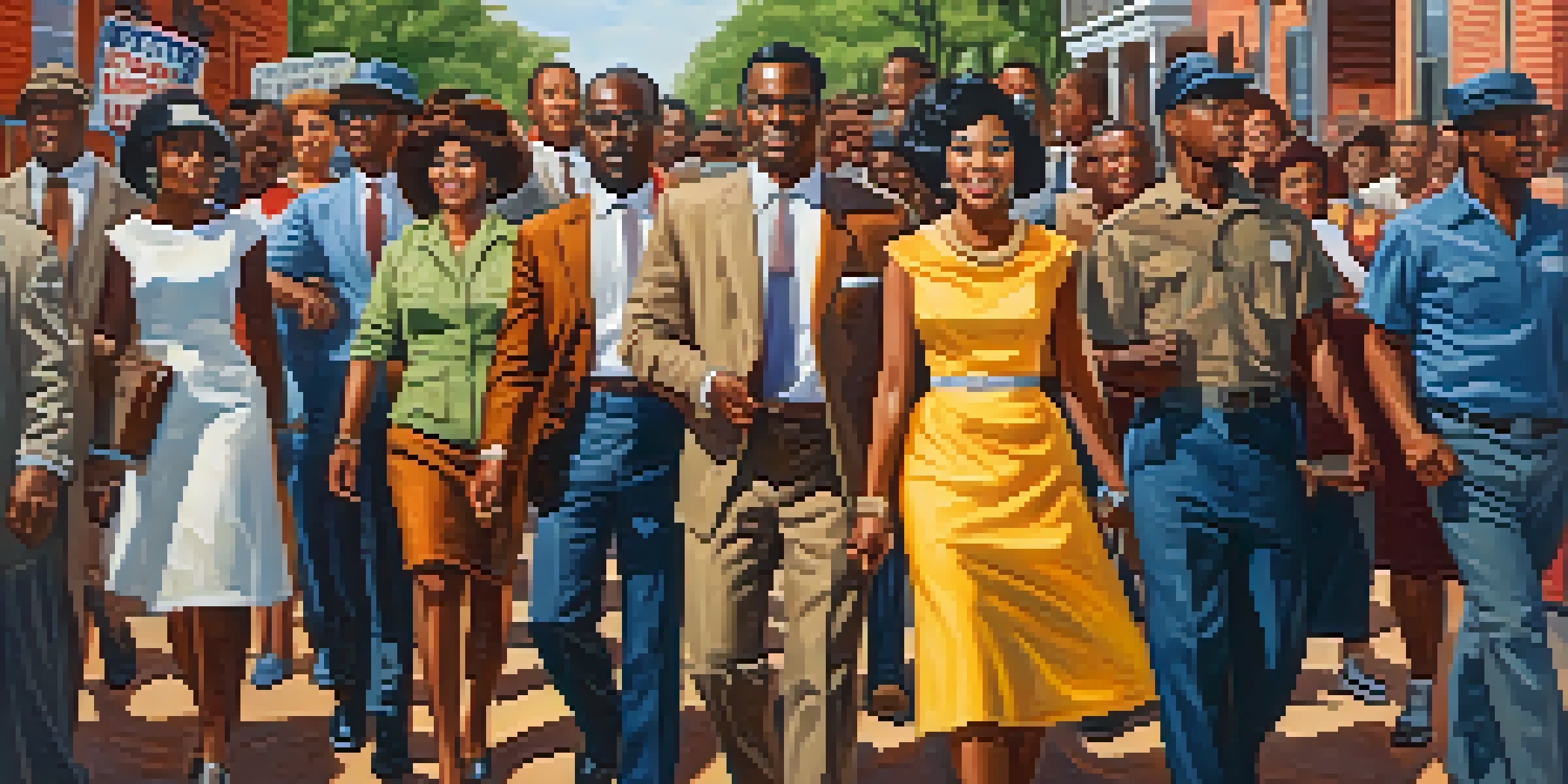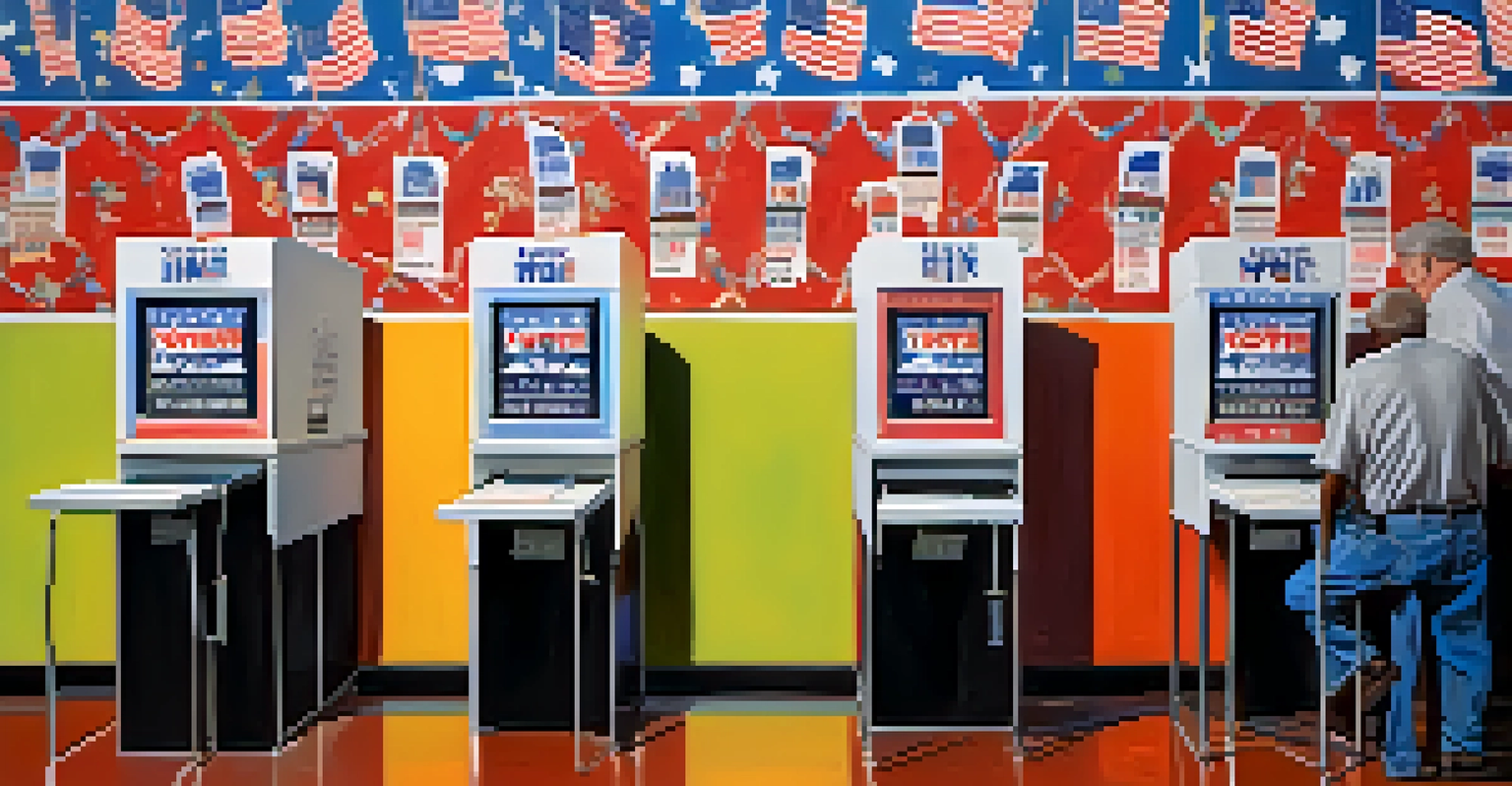Voting Trends in Louisiana: A Historical Perspective

The Origins of Voting Rights in Louisiana
Voting rights in Louisiana have a complex history that dates back to the early 19th century. At that time, the electorate was largely limited to white male landowners, reflecting the broader societal norms. However, as the state evolved, so did the laws surrounding who could vote, especially after the Civil War and during Reconstruction.
Voting is the foundation stone for political action.
The Reconstruction era marked a significant shift, as newly freed African Americans actively participated in the electoral process. For a brief period, they held political offices and influenced legislation, which was a revolutionary change at the time. Yet, this progress faced significant backlash from white supremacist groups, leading to the implementation of discriminatory laws.
By the late 19th century, Louisiana adopted a series of measures, such as literacy tests and poll taxes, that effectively disenfranchised many voters, particularly African Americans. This period exemplifies the state's struggle between advancing democracy and suppressing it, setting the stage for ongoing voting rights battles.
The Impact of Jim Crow Laws on Voting
The Jim Crow era brought about a new wave of voting restrictions that significantly impacted Louisiana. These laws enforced racial segregation and established barriers that aimed to disenfranchise Black voters. Literacy tests, understanding clauses, and other tactics were used to undermine the rights of African Americans, effectively silencing their voices in the political arena.

Despite the oppressive environment, many Black citizens found ways to resist and fight for their voting rights. Organizations emerged, advocating for equal access to the polls and challenging the legality of discriminatory laws. This grassroots activism laid the groundwork for future civil rights movements in the state.
Voting Rights Evolve in Louisiana
Louisiana's voting rights have shifted from exclusive access for white male landowners to broader participation, particularly after the Civil Rights Movement.
The struggle for voting rights in Louisiana during the Jim Crow era illustrates the resilience of a community that refused to be silenced. Even in the face of overwhelming odds, their efforts to secure the ballot demonstrated the power of collective action and the importance of civic engagement.
The Civil Rights Movement and Voting Access
The Civil Rights Movement of the 1960s was a pivotal moment in Louisiana's voting history. Activists rallied to dismantle the Jim Crow laws that had long oppressed African Americans. Events like the Selma to Montgomery marches inspired local leaders to mobilize citizens and demand their rights at the ballot box.
The vote is the most powerful nonviolent tool we have.
In 1965, the Voting Rights Act was passed, marking a significant victory for civil rights advocates. This legislation aimed to eliminate the barriers that prevented minority groups from voting, including those in Louisiana. As a result, the state saw a surge in voter registration among African Americans and an increase in their participation in elections.
The passage of the Voting Rights Act not only transformed the political landscape of Louisiana but also empowered a generation to assert their rights. It served as a reminder that the fight for voting access was far from over, as there would still be challenges in maintaining these hard-won rights.
Recent Trends in Louisiana Voting Patterns
In recent years, Louisiana's voting patterns have reflected broader national trends, with increasing polarization among voters. The state has experienced shifts in party loyalty, with a growing number of independent voters and changing demographics influencing election outcomes. These trends highlight the evolving political landscape and the importance of understanding local contexts.
Additionally, voter turnout has become a focal point of analysis in Louisiana. Factors such as socioeconomic status, education, and access to polling places have played significant roles in determining who casts their ballot. Efforts to increase turnout, particularly among underrepresented groups, remain crucial as elections approach.
Jim Crow Laws Disenfranchise Voters
The Jim Crow era introduced restrictive laws that systematically disenfranchised African American voters, highlighting the ongoing struggle for equal access to the polls.
The recent trends demonstrate that voting in Louisiana is not just about choosing candidates but also about the ongoing struggle for representation and equality. Engaging with these complexities is essential for understanding the future of voting in the state.
The Role of Technology in Modern Voting
Technology has significantly transformed the voting experience in Louisiana over the past few decades. From electronic voting machines to online voter registration, technological advancements have aimed to streamline the electoral process. However, these changes have also raised questions about security and accessibility.
One of the most notable shifts has been the introduction of early voting and absentee ballots, which provide more options for citizens to participate in elections. This increased accessibility has been particularly important for those with scheduling conflicts or mobility challenges. By allowing voters to cast their ballots in more flexible ways, Louisiana has taken steps to encourage participation.
As technology continues to evolve, so too does the need for vigilance in protecting voter information and ensuring fair access. The balance between innovation and security is crucial to maintaining the integrity of the electoral process in Louisiana.
Challenges Facing Voter Registration in Louisiana
Despite progress, Louisiana faces ongoing challenges with voter registration. Bureaucratic hurdles, misinformation, and lack of outreach can hinder efforts to register new voters, particularly among young people and marginalized communities. Addressing these barriers is essential for fostering a more inclusive electoral process.
Community organizations have stepped up to fill the gap, providing resources and assistance to help individuals navigate the registration process. These grassroots efforts are vital in ensuring that every eligible voter has the opportunity to participate in elections. Collaboration between local groups and government agencies can further enhance these initiatives.
Technology Changes Voting Landscape
Recent technological advancements have transformed the voting experience in Louisiana, improving accessibility while also raising concerns about security and fairness.
The challenges of voter registration highlight the importance of education and advocacy in the democratic process. By empowering citizens with the knowledge and tools they need, Louisiana can work toward a more representative electorate.
Looking Ahead: The Future of Voting in Louisiana
As Louisiana looks to the future, the landscape of voting will continue to evolve. With demographic shifts and changing political dynamics, understanding the direction of voting trends is crucial for both policymakers and citizens. Engaging younger voters and addressing their concerns will be key to shaping future elections.
Moreover, the national conversation around voting rights has heightened awareness of the importance of equitable access to the polls. Louisiana will likely see continued advocacy efforts aimed at protecting and expanding voting rights for all citizens. These movements emphasize the ongoing need for vigilance and activism.

Ultimately, the future of voting in Louisiana will depend on the collective efforts of its citizens to uphold democratic values. By learning from history and staying engaged, Louisianans can work toward a more inclusive and representative electoral system.